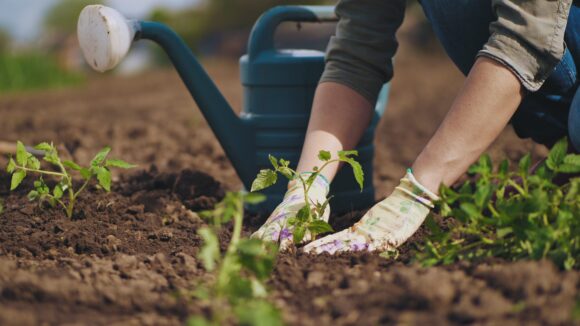
By Steven Yergeau, Agriculture and Natural Resources Agent, Rutgers Cooperative Extension of Ocean and Atlantic counties.
As Earth Day approaches in the month of April, we are reminded of steps we can take to protect our environment. At home, work or school, our daily choices can help keep pollution out of our air, water and soil. A good place to start becoming more environmentally friendly is in our own yards and gardens. Whether you’re a novice gardener or have a seasoned green thumb, here are some gardening tips and resources for building a sustainable landscape.
Right Plant in the Right Place
One should start their journey to an environmentally friendly yard and garden by picking the proper plants. The wrong vegetation can lead to plant loss, invasive species taking over the region, or extra time, money and effort being spent to condition your soils to support an inappropriate plant.
An attractive yard and productive garden start with getting to know your soil. Healthy lawns and gardens start with healthy soil, but many homeowners don’t know what their soils need. Get the dirt on your soil through a soil test from the Rutgers Soil Testing Laboratory, which provides recommendations on the amount and type of nutrients needed for your soil and a plan of action for your plants.
Go native with your plant selections. Native species of plants are acclimated to local weather and soil conditions, requiring less water and soil amendments than non-native vegetation.
Contact your local Cooperative Extension office to help with your home horticulture needs through either its experienced staff or certified Rutgers Master Gardeners.
Use Water Wisely
Daily water use in New Jersey jumps from around 70 gallons per person, per day to more than 150 gallons from April through October. This increase is due to watering of lawns, gardens and landscape plants during the growing season.
Most vegetables and landscape plants need only about 1 to 1.5 inches of water per week. This total includes any rain that has fallen. Overwatering your plants or watering too frequently is not only wasteful but can be harmful to your plants. Overwatering can promote fungal diseases that affect plant roots as they sit in saturated soils. Look for yellow or wilted leaves on your plants, muddy soils, and mosses, molds or mushrooms as signs of possible excess water being applied to your garden or yard.
The best way to measure water use is with a rain gauge installed in an area clear to receive rainfall. There are many smartphone apps that are available to gardeners to track recent precipitation. A quick online search can find the best one for your needs. You can also visit Rutgers NJ Weather Network to find local precipitation readings.
Excess water may also produce runoff which can wash healthy topsoil off your property and carry anything that may be added to your soil or plants—like pesticides or fertilizers—to adjacent properties or local waterways. Contaminated runoff causes water quality problems in many streams, rivers, lakes, and bays throughout New Jersey.
Adding a layer of mulch can protect topsoil by preventing erosion while also retaining moisture in the soil for nearby plants. Natural mulches, like weed-free straw, grass clippings, leaves and wood chips, prevent evaporation and reduce drying from wind. Mulch also helps to reduce the force of rain splashes and slows down runoff, which can help to prevent erosion.
Water can be conserved with mulches, and they will also suppress weed growth and make weeds that do grow easier to remove. Any gardener knows that time saved weeding is time that can be spent enjoying your garden or landscaped areas. There are many varieties of mulch to choose from so choose one that’s appropriate for your garden or landscape beds.
Resources
Additional resources available for homeowners interested in maintaining sustainable landscapes include the Rutgers Cooperative Extension (RCE) ‘Earth Day, Every Day’ E2D2 webinar series and the Jersey-Friendly Yards program.
Launched in April 2020 to celebrate the 50th anniversary of Earth Day, the E2D2 webinar series focuses on steps everyone can take to become more sustainable. From environmentally friendly lawn care, to reducing plastic waste and energy usage, to creating wildlife habitat, all the webinars are available to view online.
The Jersey-Friendly Yards program was started by the Barnegat Bay Partnership to protect the bay from overfertilization by outlining an eight-step plan to create a yard that looks attractive and protects the environment. A wealth of resources is on their website, including recorded webinars.
More information can be found through various New Jersey Agricultural Experiment Station and RCE publications. With these tips and tricks, you can be on your way to having a landscape that protects your corner of the Garden State.

